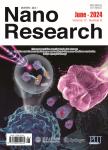Opto-valleytronics in the 2D van der Waals heterostructure
在 2D 货车 der Waals heterostructure 的 Opto-valleytronics作者机构:Division of Physics and Applied PhysicsSchool of Physical and Mathematical SciencesNanyang Technological UniversitySingapore637371Singapore The Photonics Institute and Centre for Disruptive Photonic TechnologiesNanyang Technological UniversitySingapore637371Singapore
出 版 物:《Nano Research》 (纳米研究(英文版))
年 卷 期:2021年第14卷第6期
页 面:1901-1911页
核心收录:
学科分类:070207[理学-光学] 07[理学] 0702[理学-物理学]
基 金:the financial support from the Singapore National Research Foundation through its Competitive Research Program(CRP Award No.NRF-CRP21-2018-0007) Singapore Ministry of Education(MOE2016-T2-2-077,MOE2016-T2-1-163 and MOE2016-T3-1-006(S)) A^(*)Star QTE programme
主 题:opto-valleytronics two-dimensional(2D)heterostructure interlayer exciton transition metal dichalcogenide proximity effect
摘 要:The development of information processing devices with minimum carbon emission is crucial in this information age. One of the approaches to tackle this challenge is by using valleys (local extremum points in the momentum space) to encode the information instead of charges. The valley information in some material such as monolayer transition metal dichalcogenide (TMD) can be controlled by using circularly polarized light. This opens a new field called opto-valleytronics. In this article, we first review the valley physics in monolayer TMD and two-dimensional (2D) heterostructure composed of monolayer TMD and other materials. Such 2D heterostructure has been shown to exhibit interesting phenomena such as interlayer exciton, magnetic proximity effect, and spin-orbit proximity effect, which is beneficial for opto-valleytronics application. We then review some of the optical valley control methods that have been used in the monolayer TMD and the 2D heterostructure. Finally, a summary and outlook of the 2D heterostructure opto-valleytronics are given.



